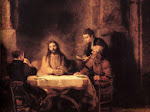
Augustine continues to struggle to make a full commitment to Christianity, mostly centered around his passion for sexual sin, but also in his concept of God given his previous experience and thought in the Manichean (Gnostic) religion. He feels paralyzed and unable to move forward to fully embrace Christianity. He is especially embarrassed when some of his intelligent friends not only embrace Christianity, but commit to a chaste lifestyle. Augustine feels torn by his two natures, though at the same time he tries to reject the dualism inherent in Manicheanism, especially since he feels the promptings of "Lady Continence" and moves off to a bench in a garden to weep.
At this point, one of the most poignant moments in literature, philosophy, and the Christian Church occurs. Augustine hears the voice of a child next door saying in a sing-song refrain, "Pick it up and read it." After pondering what this might be, Augustine concluded it's the voice of God that he should open his Bible and read the first chapter he found. He found, "Not in riotousness and drunkenness, not in lewdness and wantonness, not in strife and rivalry,: but put on the Lord Jesus Christ, and make no provision for the flesh and its lusts. (Romans 13:13-14.) Augustine remarks he didn't need to read more. "No sooner than had I finished the sentence than it was as if the light of steadfast trust poured into my heart, and all the shadows of hesitation fled away."


